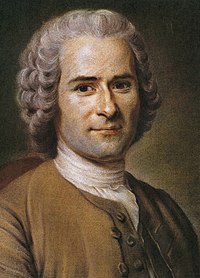Jean-Jacques Rousseau on GOD
Author/Compiler: Tihomir Dimitrov (http://nobelists.net; also see http://scigod.com/index.php/sgj/issue/view/3)

JEAN-JACQUES ROUSSEAU (1712-1778), founder of modern deism
1. In his renowned educational book Emile (1762), Rousseau wrote:
“Whether matter is eternal or created, whether its origin is passive or not, it is still certain that the whole is one, and that it proclaims a single intelligence; for I see nothing that is not part of the same ordered system, nothing which does not co-operate to the same end, namely, the conservation of all within the established order. This being who wills and can perform his will, this being active through his own power, this being, whoever he may be, who moves the universe and orders all things, is what I call God. To this name I add the ideas of intelligence, power, will, which I have brought together, and that of kindness which is their necessary consequence.” (Rousseau 1911, Book IV).
2. “God is intelligent, but how? Man is intelligent when he reasons, but the Supreme Intelligence does not need to reason; there is neither premise nor conclusion for him, there is not even a proposition. The Supreme Intelligence is wholly intuitive, it sees what is and what shall be; all truths are one for it, as all places are but one point and all time but one moment. Man’s power makes use of means, the divine power is self-active. God can because he wills; his will is his power. God is good; this is certain; but man finds his happiness in the welfare of his kind. God’s happiness consists in the love of order; for it is through order that he maintains what is, and unites each part in the whole.” (Rousseau 1911, Book IV).
3. “It is not in my power to believe that passive and dead matter can have brought forth living and feeling beings, that blind chance has brought forth intelligent beings, that that which does not think has brought forth thinking beings. I believe, therefore, that the world is governed by a wise and powerful Will; I see it or rather I feel it, and it is a great thing to know this.” (Rousseau 1911, Book IV).
4. In a letter to Voltaire, Rousseau wrote:
“I have suffered too much in my life not to look forward to another. Not all the subtleties of metaphysics can shake for one moment my belief in a beneficent Providence. I sense the existence of Providence, I believe in it, I insist on it, I hope for it, I shall defend it to my last breath.” (Rousseau, as cited in Guéhenno 1966, 351; see also Caputo 2000, 65).
5. “God makes all things good; man meddles with them and they become evil. He forces one soil to yield the products of another, one tree to bear another’s fruit. He confuses and confounds time, place, and natural conditions.” (Rousseau 1911, Book I).
6. “Conscience! Conscience! Divine instinct, immortal voice from heaven; sure guide for a creature ignorant and finite indeed, yet intelligent and free; infallible judge of good and evil, making man like to God! In thee consists the excellence of man’s nature and the morality of his actions; apart from thee, I find nothing in myself to raise me above the beasts - nothing but the sad privilege of wandering from one error to another, by the help of an unbridled understanding and a reason which knows no principle.” (Rousseau 1911, Book IV; see also Hampson 1969, 34).
- Log in to post comments




Recent comments